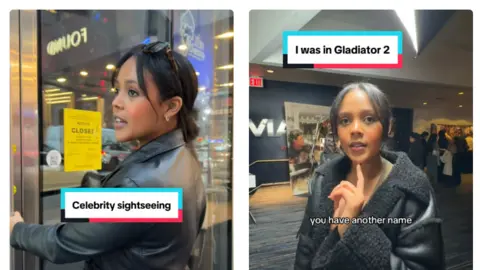
 Wenta Zissou
Wenta Zissou“I feel a lot of hate.” Words from content creator Winta Zissou, who last year made $150,000 (£117,000) from posting on social media.
What sets Winta apart from other influencers? People who comment on her posts and drive traffic to her videos often do so out of anger.
“Every video of mine that got millions of views was because of hate comments,” the 24-year-old explains.
In these videos, she documents the life of a model in New York City, whose biggest problem is that she is too beautiful. What some in the comments don't realize is that Winta is playing a character.
“I get a lot of bad comments, with people saying: 'You're not the prettiest girl', or 'Please don't put yourself down, you have too much confidence,'” she told the BBC from her apartment in New York City.

Winta is part of a growing group of online content creators who create “rage-bait” content, where the goal is simple: record videos, produce memes, write posts that deeply anger other users, and then enjoy thousands, or even millions, of shares and likes.
It differs from clickbait, its online cousin, where the headline is used to entice the reader to click to view a video or article.
As broadcast marketing expert Andrea Jones notes: “A hook reflects what's in that piece of content and comes from a place of trust, whereas outrage-inciting content is designed to be manipulative.”
But the impact of negative content on human psychology is ingrained in us, according to Dr. William Brady, who studies how the brain reacts to new technologies.
“In our past, this was the type of content that we really needed to pay attention to, so we have these biases built into our learning and attention,” he explains.
 Megan Moyer
Megan MoyerThe growth in outrage content has coincided with major social media platforms paying content creators more for their content.
These content creation programs — which reward users for likes, comments, and shares, and allow them to post sponsored content — have been linked to a rise.
“If we see a cat, we say, ‘Oh, that’s cute,’ and we keep scrolling.” But if we see someone doing something outrageous, we might write the comments, “That’s terrible,” and that kind of comment is seen as a higher-quality post by the algorithm. ,” explains broadcast marketing expert Andrea Jones.
“The more user generated content, the more engagement they get, and the more money they get.
“So, some creators will do anything to get more views, even if it's negative or makes people angry and angry. This leads to disengagement,” she says on a worried note.
Anger-tasting content comes in many forms, from outrageous food recipes to attacks on your favorite pop star. But in a year that witnessed global elections, especially in the United States, the taste of anger extended to politics as well.
As Dr. Brady notes: “There has been a huge uptick in election preparedness, because it is an effective way to mobilize your political group to vote and take action.”
He points out that the US election was light on politics, and instead centered around anger, adding: “It was overly focused on ‘Trump is terrible for this reason’ or ‘Harris is terrible for this reason’.”
 Getty Images
Getty ImagesAn investigation by BBC social media investigative correspondent Marianna Spring Found some users on X The social media site was paid “thousands of dollars” to share content containing misinformation, artificial intelligence-generated images and baseless conspiracy theories.
Some who study trends worry that too much negative content can turn the average person off.
“It can be exhausting to have such high emotions all the time,” says Ariel Hazel, assistant professor of communications and media at the University of Michigan.
“It takes them out of the news environment, and we're seeing increasing amounts of active news avoidance around the world.”
Others worry about the normalization of offline anger and the impact on people's trust in the content they watch.
“Algorithms amplify anger, making people think it's more normal,” says social psychologist Dr. William Brady.
“What we know from certain platforms like X is that politically extremist content is actually produced by a very small portion of the user base, but algorithms can amplify it as if they were a majority,” he adds.
The BBC contacted major social media platforms regarding the issue of anger on their sites, but did not receive any responses.
In October 2024, Meta CEO Adam Mosseri Posted on topics About “increasing the taste of sharing” on the platform, adding: “We are working to control it.”
While Elon Musk's competing X platform, Recently announced the change To a creator revenue share program that will see creators compensated based on the engagement of featured site users – such as likes, replies and reposts. Previously, compensation was based on the ads viewed by premium users.
TikTok and YouTube allow users to monetize their posts or share sponsored content as well, but they have rules that allow them to de-monetize or suspend profiles that spread misinformation. X doesn't have guidelines on misinformation in the same way.
Back at Winta Zissou's apartment in New York City, the conversation – days before the US elections – turns to politics.
“Yes, I don't agree with people using the bait of anger for political reasons,” the creator says.
“If they're really using it to educate and inform people, that's fine. But if they're using it to spread misinformation, I totally disagree with that.”
“It's not a joke anymore.”









